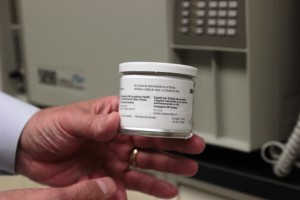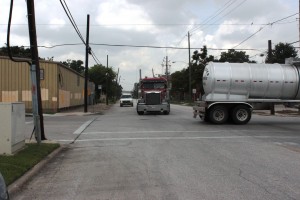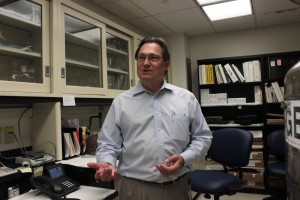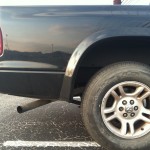Researching Dirty Air’s Effect on Health: Are Some Texans Immune?

Dave Fehling / StateImpact
Air pollution in a can: air sample awaiting analysis at UT School of Public Health
For years now, Texas has tried to block Federal air pollution laws, contending they stifle economic growth. But just last week, the U.S. Department of Justice filed another lawsuit to force power plants in northeast Texas to reduce toxic air emissions.
As the battle continues over how clean the air in Texas should be and at what cost, It might be worth highlighting why any of this matters.
One way to do that is ask researchers what they’re learning about how air pollution affects people. Scientists are finding that it’s like a pack-day-smoker who ends up living into old age: polluted air doesn’t have the same impact on everyone.
Pollution Immunity
“What we now understand is people are quite different in terms of their immune systems,” said Dr. William Calhoun at the University of Texas Medical Branch on Galveston Island. He says there’s a lot of research now to find out exactly why immune systems react differently to pollution.
“For most people who have healthy lungs, healthy hearts, the amount of risk that is attributed to air pollution is in fact pretty small,” Dr. Calhoun told StateImpact.

Houston's Manchester neighborhood featured in the RADIO STORY
What he says is clear is that dirty air exacerbates problems for people with asthma and other serious diseases.
“It turns out that for reasons that are not all together clear— but are completely unequivocal—people who have heart disease are also at risk for bad air quality. And bad air quality can be associated with an increased risk of heart attacks.”
Where Texas Ranks
Texas has the biggest concentration of petrochemical plants and refineries and the most coal-burning power plants in the nation. Yet, according to the American Lung Association’s “State of the Air” report which crunched federal pollution data, Houston and Dallas rank seventh and eighth worst in the nation for ozone. Beaumont came in 20th.
The cities that dominated the “worst” list were in California. Texas cities didn’t even make it into the 25-worst for what’s called particle pollution which can be from coal power plants and diesel engines.
At the University of Texas Health Science Center in Houston, Dr. Arch Carson does air quality research. He says Texas is lucky since it’s mostly flat and pollution doesn’t get trapped by mountains.
“But I still don’t think we can go to sleep at night thinking that our job is done. There’s much more to do in terms of cleaning up the air, “said Dr. Carson.
The Danger of Ultrafine

Dave Fehling / StateImpact
Dr. Arch Carson in a lab at the UT School of Public Health in Houston
In a laboratory inside UT’s School of Public Health at the Texas Medical Center, Dr. Carson showed the equipment used to analyze air samples that are delivered to the lab in little silver cans. What researchers look for these days goes way beyond the ozone and dust that years ago was the focus.
Now, they’re also concerned about what are called ultrafine particles. They come from vehicle exhaust and industrial processes.
“It has been shown that ultrafine particles when you breathe them into your respiratory system, they don’t just have an effect there, they can actually penetrate your lungs and go into your blood stream and travel around to other organs in your body and have health effects there,” said Dr. Carson. “Some of the cancer and cardiovascular disease that occurs at fairly high rates around (Houston) could well be due to air pollution.”
